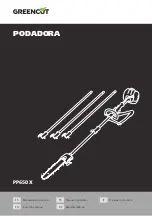
ERBAUER 254MM (10”) DOUBLE BEVEL SLIDING MITRE SAW
14. Cutting base moulding
Base mouldings and many other mouldings can
be cut on a compound mitre saw. The setup of
the saw depends on moulding characteristics and
applications, as shown. Perform practice cuts on
scrap material. To achieve best results:
1) Always make sure mouldings rest irmly against
fence and table. Use hold-down or G-clamps,
whenever possible, and place tape on the area
being clamped to avoid marks.
2) Reduce splintering by taping the cut area prior to
making cut. Mark cut line directly on the tape.
3)l Splintering typically happens due to wrong blade
application and thinness of the material.
Note:
Always perform a dry run cut so you can
determine if the operation being attempted is
possible before power is applied to the saw.
15. Cutting crown moulding
Your compound mitre saw is suited for the dificult
task of cutting crown moulding. To it properly, crown
moulding must be compound mitred with extreme
accuracy. The two surfaces on a piece of crown
moulding that it lat against the ceiling and wall are at
angles that,
when added together,
equal exactly 90°.
(See ig. 39,40)
Most crown moulding has a top rear angle (the
section that its lat against the ceiling) of 52° and a
bottom rear angle (the section that its lat against
the wall) of 38°.
In order to accurately cut crown moulding for
a
90° inside or outside corner,
lay the moulding
with its broad back surface lat on the saw table.
When setting the bevel and mitre angles for
compound mitres, remember that the settings are
interdependent – changing one changes the other,
as well. (See ig. 41&42)
Fig 39
Fig 40
Fig 41
F
e
n
c
e
Mitre at 45
o
, bevel at 0
o
F
e
n
c
e
Mitre saw table
F
e
n
c
e
Mitre saw table
Mitre saw table









































